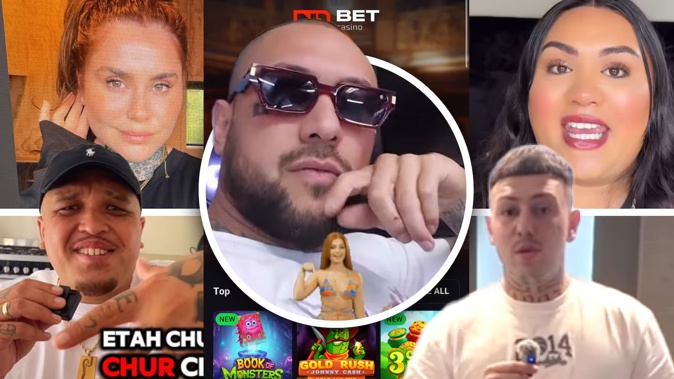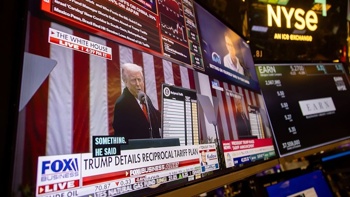
- The Department of Internal Affairs has ordered a number of Māori influencers to stop promoting overseas gambling sites - and is monitoring several more accounts.
- If they refuse, they will face prosecution or $10,000 fines.
- Jason Alexander from Māori health organisation Hāpai Te Hauora says overseas online casinos are deliberately exploiting Māori, who are vulnerable to gambling.
- Minister for Internal Affairs Brooke van Velden says new legislation will tighten online gambling regulations from February 2026.
The Government is cracking down on high-profile Māori social media influencers who are being paid by global gambling organisations to entice their followers to their gaming sites.
The Department of Internal Affairs has ordered four top influencers to stop immediately or face prosecution - but it won’t reveal which four.
It has also confirmed it is monitoring another 13 accounts that it hasn’t sent letters to.
As it is illegal for overseas gambling sites to advertise in New Zealand, influencers are prohibited from promoting and publishing advertising for overseas gambling sites on their platforms.
Māori health organisation Hāpai Te Hauora told the Herald that a range of Māori influencers have promoted online gambling, including CWK aka Nix Adams, Memoirs of a Māori, Jaymuk, The Cuzzy Trex, Millie Elder-Holmes and digital creator Uncl lingling, aka gang member Calen Morris.
Vicki Scott, Department of Internal Affairs Director of Gambling told the Herald the DIA issued the four warnings last week.
“We are unable to name any influencers at this stage to protect their privacy and their right to dispute warnings. However, we’d be happy to receive information about any suspected parties to ensure no stone is left unturned in our investigations,” Scott said.
She said the DIA would continue to monitor all social media accounts and would take further action if warranted.

Uncllingling is gang member Calen Morris. He told the Herald the government only wants to regulate gambling to get more tax from it.
Calen Morris - who has promoted gambling to his 78,000 Instagram followers under the handle Uncllingling - says he isn’t one of the four people who received a letter from the Department of Internal Affairs.
He said the government is only thinking about the tax it will be able to get from regulating online gambling.
He told the Herald he had negotiated his own deal with overseas casinos.
“If you have good negotiating skills, then you’ll get good money” he said.
“Online gambling is going to come back in February even harder [after being regulated]. The government don’t care about the Māori people, or why would they be selling licences to 15 online overseas casinos - [it’s to get] tax.
“I am not an influencer, I just do my stuff online. I am all for the people and I give back to the people. Even with my gambling stuff. I make the gambling organisations give me prizes so I can give them back to the people.
“I said to them, you want me to do the devil’s work, you have to give back.”
Morris said he has also been contacted by vape companies wanting him to influence kids to buy vapes, and has refused.
In January, husband and wife Māori influencer pair Kaden Ratu and Olivia Ratu said they had rejected more than $20,000 to promote online gambling, and encouraged others to do the same.

Husband and wife social media influencers Olivia Ratu and Kaden Ratu have rejected offers of money to promote gambling in favour of more wholesome content. Photo / Michaela Gower
They told NZME at the time that their values were more important than the money, and that influencers who shared gambling content were often not aware of the consequences it had on their followers’ lives.
“There are so many people online that have got the platforms to use for good and they are choosing to use it to make money and not care about our communities - and I think it is wrong” Olivia told NZME in January.
She said it was important to her to promote content she and her husband believed in, and that helped elevate their online community.
Māori Health Organisation Hāpai Te Hauora chief operating officer Jason Alexander applauded the DIA’s letter, and stand on harm minimisation for Māori.
“Māori make up 17% of the population and 30% of problem gamblers” he said. “Organisations using those Māori influencers to exploit Māori should be banned from New Zealand.
“These gambling companies are knowingly using Māori influencers to reach Māori audiences. It’s not just harmful - it’s calculated, it’s manipulative, and it shows they have no regard for the wellbeing of our whānau.”
Alexander said new legislation would hopefully stop those rogue organisations that target Māori.
“What’s really worrying is that these same companies - the ones illegally targeting our people now - could be operating legally here as early as next year. Their current behaviour shows exactly how little they care about whānau. If this is how they act before regulation, what will they do once they’re in the system?”
“Gambling harm is already ripping through our communities. We can’t let social media become another weapon in that fight.”
Alexander said Hāpai would like a complete ban on gambling advertising in Aotearoa - including influencer marketing.
Scott said the letter - sent by the DIA to four influencers on March 25, outlines the legislation and the Gambling Act 2003.
“Based on evidence the Department has obtained, the Department considers that your social media posts concerning since are non-compliant with section 16 of the Act. As the owner of this content, you are responsible for ensuring all content is compliant with the requirements of the Act,” the letter obtained by the Herald said.

A request from a casino asking an influencer to promote online gambling for a fee.
The letter also threatened a fine of up to $10,000 for those who failed to comply.
“In this case, I have decided not to prosecute or issue an infringement notice for this offence. However, this letter is a formal warning that I consider that you have committed an offence under section 16 of the Act. Any future breaches of Section 16 may result in an infringement notice being issued, or prosecution,” wrote the author, whose name was redacted.
“The Department recommends that you immediately cease posting any reference to overseas online gambling or gambling operators to your social media. This includes any posts made in your likeness by others acting on your behalf (such as social media agencies),” the letter concluded.

Hāpai Te Hauora chief operating officer Jason Alexander wants to see global casinos prevented from targeting Māori. Photo / NZME
Scott said gambling among Māori has major harm impacts on whānau.
“We know from the recently released New Zealand Gambling Survey that in the 12 months prior to the survey, approximately 69.9% of Māori participated in some form of gambling and that 7.1% of Māori participated in overseas online gambling,” she said.
Brooke van Velden’s Online Gambling Bill- set for select committee this year - will regulate online gambling in New Zealand with fines up to $5 million for unlicensed operators.
Foreign companies are likely to dominate New Zealand’s internet gambling market as the Government auctions online casino licences for the first time.
The new regulations will start in February 2026.
“The online gambling regulatory system will include strict rules for licensed online casinos to ensure harm is minimised and prevented” Scott told the Herald.
“This will include controls on advertising and the ability to hold casinos to account if the rules are broken. These controls will be vital to minimise harm for all New Zealanders, and particularly for Māori given the increased risk of harm,” Scott said.

One influencer's page has a direct link to an online casino site.
Scott said the DIA is very conscious that Māori experience gambling harm at a higher rate than other groups.
“We take a dim view of any gambling operators or influencers targeting people who are vulnerable to gambling harm,” Scott said.
“Māori are approximately 2.62 times more likely to be moderate-risk or problem gamblers compared to non-Māori & non-Pacific.
The new online gambling legislation will tighten behaviours of rogue organisations, Scott said.
Online casino licenses will be issued for three years under the new regime.
“There will be strict entry requirements for online gambling companies looking to operate in New Zealand. These will include identification of persons involved in the company, their criminal records and interests in other gambling-related companies both here and overseas, harm prevention and consumer protection strategies, and any proposed marketing strategy, amongst other requirements.
“As the regulation of online casinos will be done via a new piece of legislation the public will also have a chance to provide input through the Select Committee process,” she said.
Where to get help:
The Gambling Helpline, 0800 654 655, 7 days a week. The Gambling Helpline is also available by texting 8006.
- Māori Gambling Helpline - 0800 654 656
- Vai Lelei Pasifika Gambling Helpline - 0800 654 657
- Youth Gambling Helpline “In Ya Face” - 0800 654 659
- Gambling Debt Helpline - 0800 654 658
Take your Radio, Podcasts and Music with you









